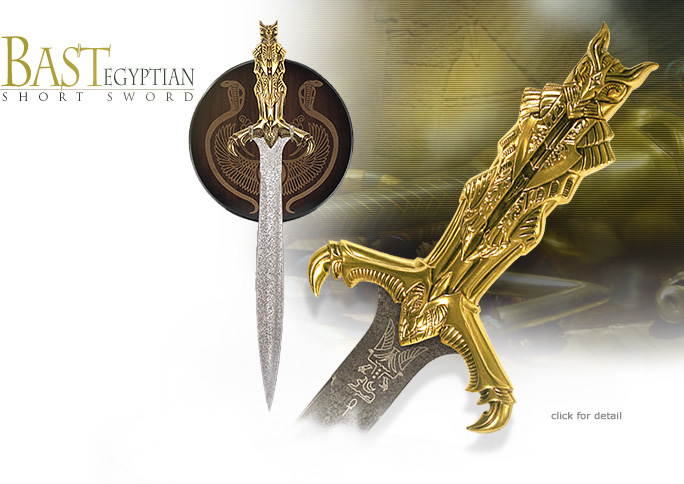BAST EGYPTIAN SHORT SWORD Special Edition Gold (UC1297) by UNITED CUTLERY Special Edition Gold (UC1297) by UNITED CUTLERY
This beautiful Egyptian Short Sword, was inspired by Bast, the goddess of fertility and joy. In early times she was depicted with the head of a lion to show her war-like side, but later in the New Kingdom of Egypt, the honored goddess gained the head of a house cat.

This adult collectible sword was constructed with careful attention to detail and craftsmanship, using only the highest quality materials. The solid metal handle parts are cast with intricate details and plated in 24-karat antique gold with a special process to give an "aged" look. Available in three versions, the UC1297 special gold edition is strictly limited to 2400 individually serialized pieces worldwide. Features include 24-K gold plated parts and blade forged of 420J2 stainless steel with a beautiful Damascus-etched finish. Complete with wall plaque, mounting hardware, and certificate of authenticity.

Bast is the known as the Sacred Cat whose name means "devouring lady". This goddess was called Bastet when in full cat form, and Bast when only having the head of one and the body of a beautiful woman. She holds the sacred rattle, Sistrum, and she possesses Utchat, the divine all-seeing eye of Ra. Worshiped all over Lower Egypt, her cult center was in Bubastis, where a temple was constructed in her honor. Built out of red granite with a sacred grove in the center, the grove was full of cats, a shrine to the goddess herself. The people of ancient Egypt turned to Bast for protection and for blessing, as she was a renowned and beloved goddess. She was the goddess of sunrise, music, dance, and pleasure as well as family, fertility, and birth. She was the protectress of women, children, and domestic cats.
|
|
|
 |
Bast Ancient Egyptian Goddess (Bastet, Pasch, Ubasti, Ba en Aset):
Daughter of the sun god Ra, wife of Ptah, and mother of Mihos, Bast is an ancient Egyptian goddess who is still greatly revered by many today. Her worship began around the year 3200 BCE during the second dynasty in northern Egypt and her city is Bubastis. There, and in many other ancient cities, Egyptians celebrated Bast’s feast day, October 31st, with great joy and enthusiasm honoring their goddess, their protectress. Although Bast originated in ancient Egypt, this goddess was worshipped in a lot of other cultures, including the Greek, Roman (where she was the second most popular goddess among women, after Isis), Germanic, and others.

Cats were very sacred animals to the ancient Egyptians. They held a high, honored position in many households and were more important even than humans. Cats were demigods in ancient Egypt. Anyone caught harming or killing a cat, even by accident, was punished by death, for cats guarded the royal granaries keeping them relatively free from vermin which threatened the food supplies.

Another aspect of Bast is her twin sister, Sekhmet. Sekhmet is also a goddess, depicted as a woman with the head of a lioness. She represents the negative, darker side of the goddess. As the lioness goddess, Sekhmet symbolizes the destructive forces in Nature and in human nature, while Bast is everything pure and good and life-giving. Together, the sister goddesses make up a whole - the balance of good and evil.
|
 |
 |
 |
|